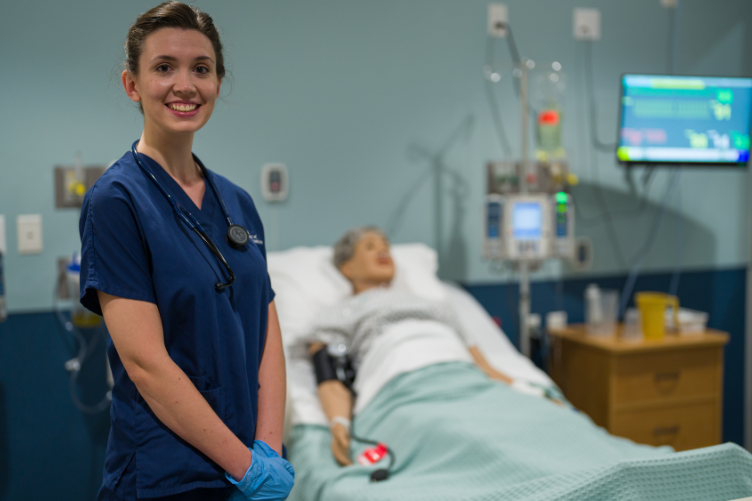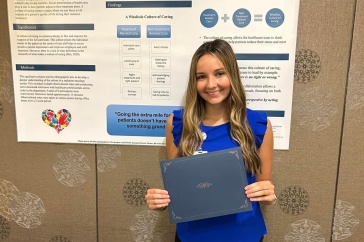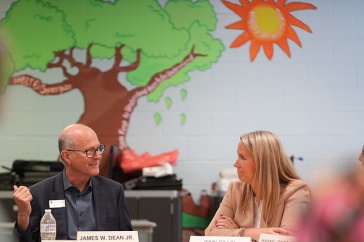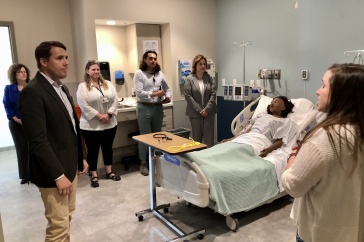
Sarah Krein ’22 knew that she wanted a career in which the focus would be to help others, so she gravitated toward health care. Her decision to pursue a degree in nursing was fostered by a volunteer position at Catholic Medical Center in Manchester, NH, which she began during her junior year in high school.
“I started out in patient services where I was responsible for delivering newspapers and mail to patients, offering beverages to waiting family members, providing patients with books, movies, and activities, and assisting with the assemblage of hospital pamphlets,” Krein says. “I interacted with some patients in this role, but my view of health care broadened when I was invited to become a volunteer in the ICU. I was able to observe health care personnel in their work much more closely for the first time. It was there that I saw the role of the nurse as the primary caregiver at the bedside, responsible for many technical interventions, but also able to provide comforting care to patients and families during a very difficult time. My experiences at CMC inspired me to pursue nursing in the hopes of being able to provide that comfort and make even a small difference in the health care experiences of patients.”
Krein was also inspired by her grandmother, who worked in hospital nursing for over 40 years, and by her great aunt – also a nurse – who worked for the American Red Cross Blood Services. The interesting and often colorful stories they told about their decades-long nursing careers highlighted the variety of opportunities available within the profession, and this further enticed Krein to pursue the field herself.
Q: Now that you are about to graduate, can you reflect back on your UNH experience and what makes you most proud?
I had a non-traditional path that led me to where I am today. Up until my first day at UNH back in August of 2018, I had been homeschooled my entire life. Given the stereotypes often attached to homeschooled students, I felt especially honored to be accepted into such a prestigious program, and particularly so after meeting many of my classmates and coming to know how smart, driven, and successful they were, with high school records to back it up. But while my background made my transition to college challenging, I think it also prepared me for nursing in a unique way that has served me well. While there are many styles of homeschooling, I was always encouraged to be a self-motivated learner and to explore subjects and topics that interested me in addition to the core classes. This is not to say that I had no structure, but with very few true deadlines, my learning hinged to a certain degree on my own initiative. I have also been a competitive Irish dancer for nearly 16 years, and my years of training, practice, disappointments and successes taught me the importance of self-motivation, hard work and resilience. Both my schooling and my chosen sport gave me the tools to motivate myself to work through the challenges of difficult classes one assignment at a time, the courage to become a regular at my professors’ office hours, and the dedication to get the most I can out of my studies. In looking back, I am most proud of how far I have come these last few years as a student and as a person, and that through my hard work and dedication, I have proven wrong the skeptics who felt I wouldn’t be successful because I was homeschooled. Learning to become a nurse has been more difficult than I could have imagined, but it has also forced me out of my shell, given me the opportunity to meet amazing, knowledgeable professors and peers, and shown me what I am capable of achieving when I set my mind to it.
"I feel especially blessed to have met so many intelligent, dedicated people in my time at UNH. The nursing class of 2022 is a driven, smart and compassionate group, and we have been incredibly fortunate to work with invested faculty who have pushed us to be our very best."
Q: What was your nursing immersion experience like?
I did my senior practicum/immersion during the summer of 2021 as part of the first nursing cohort to complete the immersion in the summer between junior and senior year. The kind of specialty to which you are assigned is based on a number of factors, but I was fortunate to be assigned to my first choice, which was a placement in labor and delivery, and specifically, a placement at Elliot Hospital in Manchester, NH. In my time there, I worked with an excellent nurse who pushed me to improve my critical thinking, patient communication, and hands-on skills, while also modeling in her own behavior how to gauge the best means of caring for each patient as an individual given their spoken and unspoken needs. I learn best through being able to perform assessments and interventions myself, so it was a great experience to be allowed to do nearly everything my preceptor did as part of her job, and it gave me a taste of how it feels to be a real nurse, which was both frightening and inspiring.
One thing I really enjoy about labor and delivery is that, when staffing allows, nurses commonly have only one patient assigned to them. This should not be construed to mean that labor and delivery nurses have loads of time on their hands, as these patients require constant monitoring and labor-intensive care, but I enjoy this 1:1 ratio because it gives the nurse time to really get to know and bond with their patient and create a therapeutic rapport that is very helpful during the stress of birth. It was an honor to assist women going through the overwhelming process of labor and birth, and I don’t think the experience of witnessing and helping to bring new life into the world could ever get old for me.
Q: What are your plans after graduation?
My main focus after graduation will be passing the NCLEX, which is the licensing exam for nurses, and I have taken a position in the birthing center at Holy Family Hospital in Methuen, MA. Currently, one of my long term goals is to go back to school and learn to become a Certified Nurse Midwife. However, I feel it is important for me to get professional nursing experience in an acute care setting before pursuing this goal.
Q: What has it been like going through the nursing program, and working in clinical environments during the COVID pandemic?
During the beginning of sophomore year, my nursing class had our white coat ceremony, which is essentially an initiation into the actual nursing program after a year of prerequisite work. At the event, Dr. Gene Harkless, the chair of the nursing department, told us that our next three years at UNH would fly by. At the time, graduation seemed far off along an uncertain road, and between then and now, I have had many long and difficult days working to keep up with the pace and rigor of the nursing program. But while each week in itself may have seemed like an eternity, looking back, I have to agree with Dr. Harkless that the semesters have flown by. Even with the hard days, I most remember the amazing experiences I have had with patients and nurses, and I feel especially blessed to have met so many intelligent, dedicated people in my time at UNH. The nursing class of 2022 is a driven, smart and compassionate group, and we have been incredibly fortunate to work with invested faculty who have pushed us to be our very best. The world of academics, just like the rest of the world, was turned upside down by the COVID-19 pandemic and I am so proud of how we have all come together and motivated each other during such difficult, unprecedented times.
I started my in-hospital clinical experiences in the fall of 2020, after the initial frightening uncertainties of the pandemic. I observed the alterations in health care and the steadily increasing problem of the nursing workforce shortage. For my two semesters of clinicals at Elliot Hospital, I was part of the Dedicated Education Unit (DEU), which is a UNH program allowing juniors to work one-on-one with a nurse rather than being in a clinical group with 5-7 other students. During that time, I noticed the continually increased strain of the pandemic on the staff. I could see the toll that the pandemic had taken on the nurses I worked with, and it was sad to hear how burned out they felt and how it was affecting their ability to provide the compassionate, patient-centered care that was so important to them. Many of my classmates went through difficult times as well; while I never personally cared for a COVID-positive patient, many of my peers did, and too many had the unenviable experience of witnessing patients die of COVID-related issues, sometimes every shift. In many ways, I think my class has seen the worst of nursing with the unprecedented staff shortages, lack of time and resources, and heart-wrenching work of watching people die before your very eyes. I don’t know if this is a blessing or a curse, but either way, it has helped to prepare us for the work that lies ahead.
  |
| Sarah Krein and classmates receive instruction in one of the Health Sciences Simulation Center skills labs |
Q: Any advice for students interested in nursing?
My first piece of advice for students interested in nursing would be to look for opportunities to observe the work of real nurses, whether it be a volunteer position, internship, LNA program, or shadow experience. This is great experience both for your application to a nursing program, and more importantly to see if you enjoy a health care environment and if you can see yourself working in one. Secondly, many people talk about how difficult nursing school is, and they are right. Learning to become a nurse is challenging, exhausting, time-consuming, frustrating, and it requires hard work, dedication, resilience, time-management and focus to keep up. But it is also incredibly worth it. In looking back on the last few years, I see some really difficult days when I was tired and disheartened and really doubted my own abilities, but I also see the faces of patients for whom I was honored to care and remember the look of trust in their eyes when I worked with them. Those memories, and the realization that I will have an opportunity every day to make a difference for people who are going through hard times, outshine all of the difficulties. So, my advice is to not let the challenges of nursing school stand in the way of you pursuing such an important and fulfilling life of service.
Q: Any last thoughts to add?
The creation of the UNH Health Sciences Simulation Center was crucial to increasing the number of qualified professionals available to enter the workforce. It shows the dedication of the nursing department, the university, and the state of New Hampshire to addressing the unprecedented shortage of nurses and improving the quality of care provided to patients. I also feel it acknowledges how important the profession of nursing is to the community and the health of its people. Nursing has sometimes been portrayed as a soft option for people who can’t get into medical school, and I find it unfortunate that it took a global pandemic for the general public to gain an understanding of the challenging, invaluable role played by nurses in health care as the primary bedside caregivers. I feel the new Simulation Center in some ways serves as a symbol, showing the true importance of this profession to the health of our communities, and it provides UNH with the opportunity to increase the number of qualified nurses entering the workforce as we continue to struggle with nursing burnout.
I don’t know if I could ever really feel emotionally prepared for the enormous responsibility carried by nurses each day, but I know intellectually that my education at UNH has prepared me with the knowledge, skills and attitude that are essential for transitioning into the role of a professional nurse. While all the reading, assignments, simulations and clinical time have often been exhausting and overwhelming, looking back I can now see how each aspect of this program has been slowly preparing all of us, building the foundations of nursing knowledge, interventional skills and critical thinking abilities that we will need going forward.
-
Written By:
Callie Carr | UNH College of Health and Human Services | callie.carr@unh.edu | 603-862-0970



















































